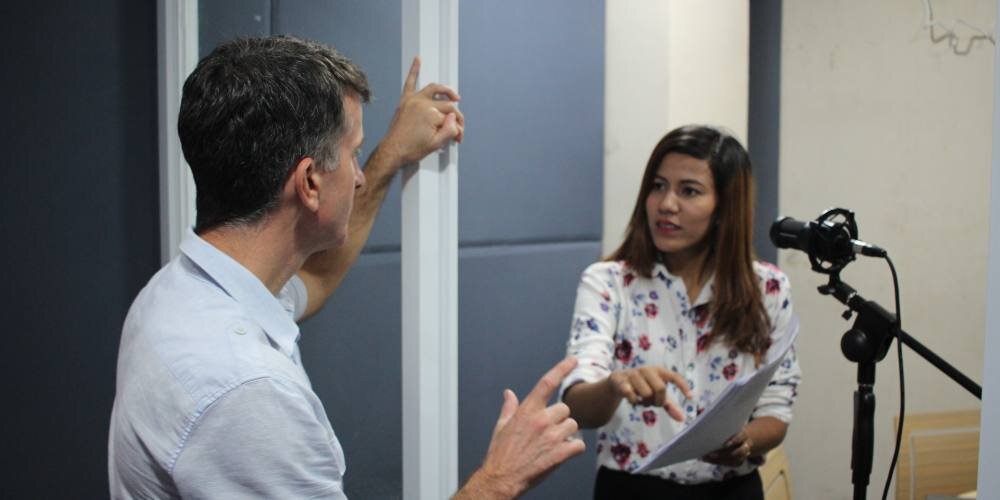Frontier Myanmar just launched the country’s first local-language podcast — on Facebook.
Doh Athan editorial adviser Martyn Brown positions a sound deck in the studio. Photo: Joshua Carroll.
When journalists approached people on the streets of Yangon last month to get their views for a new human rights podcast, they typically got two responses: “What’s a podcast?” was one. “What are human rights?” was the other.
The three-person team behind Doh Athan, or Our Voice, face an unusual challenge as they launch in a country that has been deprived of both internet access and independent media for decades: their key concept is poorly understood and few are familiar with the platform they’ve chosen.
Even the show’s producer, Win Zar Ni Aung, furrows her brow slightly as she tries to recall when she herself learned the phrase ‘human rights’. “It was in 2012,” she says, shortly before entering the newly-built studio to record episode three. “No, 2013.”
While Myanmar’s de facto leader and former democracy icon Aung San Suu Kyi has been widely loved inside the country for decades, her status as an exemplar of human rights was part of a narrative more often used by those abroad.
Meanwhile censorship helped keep many Burmese people from learning the nomenclature of human rights. Now, Win Zar Ni Aung and sound editor Htet Htet Naing are producing Myanmar’s first ever local language podcast to encourage discussions of rights by telling the stories of ordinary people deprived of theirs.
“That could involve farming issues, healthcare issues, fishing, or conflict in Shan and Kachin, court cases, media, the minimum wage or women’s rights,” says editorial adviser Martyn Brown.
For episode three, Win Zar Ni Aung arrived early at the home of a young blind woman to travel with her during her morning commute on one of Yangon’s loud, hectic, and often poorly driven buses.
The feature reveals a city where public space is hostile to people with disabilities. Episode four will focus on a women’s self-defense class tackling rampant street harassment.
The podcast is a partnership between news magazine Frontier Myanmar and Fondation Hirondelle, a Swiss non-profit that promotes media freedom in crisis-hit countries. The Dutch government donated US$207,000 for the first two years of the project, with about half of those being allocated to training and funding equipment for ethnic minority media groups.
As he fiddles with cables running from a sound deck in the new studio, Brown explains he is installing the gear himself to keep costs down.
When the funding from Hirondelle is gone, Frontier will introduce ads to ensure the podcast stays financially viable, says Sonny Swe, the magazine’s CEO and co-founder. “Our aim is to keep it alive forever.” To help achieve that, the Doh Athan team will work closely with other journalists and “gel into the newsroom”, enabling them to benefit from Frontier’s existing resources and expertise.
Doh Athan is part of a wider ambition the CEO has to expand into broadcasting. “My dream is to have a radio station,” he says.
Hirondelle also wanted to support the launch of a radio station, but decided on a podcast because it is not yet possible to get a broadcasting license and because Myanmar’s smartphone use has skyrocketed in recent years.
MORE ON FRONTIER MYANMAR
Our case study around the Frontier membership program
Sonny Swe’s Beta 2020 session on how they built their membership program
Sonny Swe on Splice Low-Res on knowing your audience
Frontier Myanmar needs your support more than ever. Sign up for a membership here.
Brown and Zar Ni discuss the script for episode three of Doh Athan. Photo: Joshua Carroll.
But podcast platforms popular elsewhere are little used in Myanmar. SoundCloud puts off many because Android users must download the app to listen, and few people in the country have iPhones.
To get around that, Doh Athan can be streamed directly from Facebook, a platform that dominates Myanmar’s internet.
There are plans to train and equip journalists working in Myanmar’s peripheral ethnic regions so they can file stories for Doh Athan. Brown also hopes to broadcast some episodes in ethnic languages.
The idea, says Brown, is to “break out” of the central cities of Mandalay and Yangon. They will also ask field staff working for NGOs in remote areas to plug Doh Athan to friends.
Other possible tools include technology that would enable people to hear the podcast over the phone.
The podcast launched at the peak of the military’s ethnic cleansing campaign against the Rohingya, which has focussed the world’s attention on Myanmar’s human rights record.
Doh Athan’s role, however, is not to piggyback on big stories, but to dig out overlooked ones in forgotten corners of the country, says Brown. “I’ve actually made a conscious decision to not focus on that, to let the big boys deal with it,” he says, although a recent episode was devoted to the issue, too large in its scale to ignore.
But for Brown and the team, their mission remains clear: “We want to tell the untold stories.”


